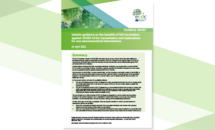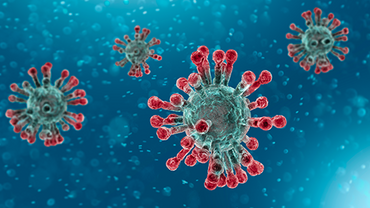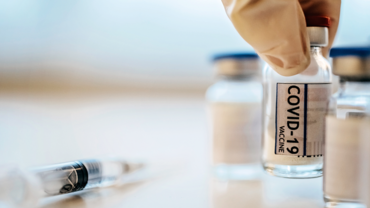Interim guidance on the benefits of full vaccination against COVID-19 for transmission and implications for non-pharmaceutical interventions
This document aims to provide interim guidance on the risks for fully vaccinated individuals to develop or transmit
infection that will give rise to severe COVID-19 disease in the context of the current epidemiological and vaccine
coverage situation in the EU/EEA.
Executive Summary
COVID-19 vaccines licensed in the EU/EEA have been shown during clinical trials to be highly effective in providing protection against symptomatic and severe COVID-19. Evidence from real-life usage of COVID-19 vaccines has confirmed these clinical trial findings and also showed high vaccine effectiveness against PCR-confirmed SARS-CoV-2 infection.
Limited evidence indicates that fully vaccinated individuals, if infected, may be less likely to transmit SARSCoV-2 to their unvaccinated contacts. Uncertainty remains regarding the duration of protection in such cases, as well as possible protection against emerging SARS-CoV-2 variants.
Viral circulation in the EU/EEA currently remains high, and the cumulative vaccination uptake in the EU/EEA is still low in the adult population aged 18 years and older, although higher in specific groups of the population targeted in the initial phases of the COVID-19 vaccine rollout, such as people aged 80 years and older and healthcare workers.
In the current context, and given the available evidence:
- The risk of developing severe COVID-19 disease for a fully vaccinated individual is very low in younger adults and middle-aged adults with no risk factors for severe COVID-19, and low in older adults or people with underlying risk factors.
- The risk of developing severe COVID-19 disease for an unvaccinated individual who has been in contact with a fully vaccinated person exposed to SARS-CoV-2 infection is very low to low in younger adults and middle-aged adults with no risk factors for severe COVID-19, and moderate in older adults or persons with underlying risk factors (limited evidence available so far).
The overall reduction in risks of severe COVID-19 disease is dependent on vaccine uptake and vaccination coverage in the general population and is modulated by several other factors, such as age and underlying conditions, vaccine characteristics, variants of concern, setting, and the epidemiological situation.
To date, given the current risks as assessed, there are specific situations in which non-pharmaceutical interventions (NPIs) can be lifted:
- When fully vaccinated individuals meet other fully vaccinated individuals (very low/low risk), physical distancing and the wearing of face masks can be relaxed;
- When an unvaccinated individual or unvaccinated individuals from the same household or social bubble meet fully vaccinated individuals, physical distancing and the wearing of face masks can be relaxed if there are no risk factors for severe disease or lower vaccine effectiveness in anyone present (e.g. older age, immunosuppression, other underlying conditions);
- When contact tracing, vaccinated contacts who have been exposed to a confirmed case should continue to be managed according to existing ECDC guidance. However, health authorities may consider undertaking a risk assessment on a case-by-case basis and subsequently classify some fully vaccinated contacts as low-risk contacts. Factors that need to be taken into consideration in such assessments include, for example, the local epidemiological situation in terms of circulating variants, the type of vaccine received, and the age of the contact. The risk of onward transmission to vulnerable persons by the contact should also be considered.
- Requirements for testing and quarantine of travellers (if implemented) and regular testing at workplaces can be waived or modified for fully vaccinated individuals as long as there is no or very low level circulation of immune escape variants (in the community in the country of origin, in the case of travellers).
- In the current epidemiological context in the EU/EEA, in public spaces and in large gatherings, including during travel, NPIs should be maintained irrespective of the vaccination status of the individuals.
- Countries considering relaxing measures for fully vaccinated people should take into account the potential for uneven inequitable vaccine access across the population.
Examples from countries where vaccination coverage is higher and severe COVID-related outcomes and SARS-CoV-2 incidence have subsequently declined, such as the United Kingdom (UK) and Israel, provide an indication of how population-level transmission can be reduced with the careful application and slow release of public health prevention measures while vaccination rollout is scaled up as quickly as possible throughout the EU/EEA.








